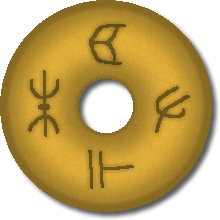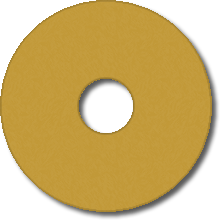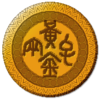Round Six (Themiclesian coin)
| Value | 1⁄13,333 qik |
|---|---|
| Mass | 28.8 g |
| Diameter | 41 mm |
| Thickness | 2.3 mm |
| Edge | Raised |
| Composition | Bronze |
| Years of minting | 2 – 1871 |
| Obverse | |
 | |
| Reverse | |
 | |
The Round Six or Round (圜六, gwrin-d.ruk) was a Themiclesian bronze coin prior to decimalization in 1871. Nominally weighing 36 twa (28.8 g), it was the oldest denominations in Themiclesian coinage, the earliest example dating to 2. After the introduction of silver coinage, it became a sub-unit of silver coinage and saw its weight reduced to 14.4 g in 1820.
History
After the institution of silver coinage as a sub-unit for gold coins, bronze coins evolved to become sub-units of silver coins. In general, bronze coins were worth 1⁄60 of silver coins per unit weight when traded as specie, a slight overvaluation against silver attributed to seigniorage. Though bronze was a base metal by Casaterran reckoning, even baser metals like lead and iron were added to counterfeits.
The usage of copper coins was somewhat constricted by the proliferation of smaller silver coins in the late 16th century, whose higher intrinsic value obviated the need for large (and consequently heavy) quantities of copper coins. After the Second Civil War ended in 1630, a new coinage formally pegged the value of bronze to silver per unit weight at 1:100, and so four 36 twa bronze pieces were equivalent in value to the small 2 qu silver piece.
